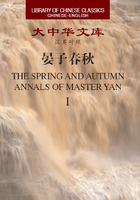
1.17 [17] 景公登牛山悲去国而死晏子谏
齐景公登上牛山感慨弃国而死的悲伤,晏子进谏
【原文】
景公游于牛山,北临其国城而流涕曰:“若何滂滂去此而死乎?”艾孔、梁丘据皆从而泣。晏子独笑于旁,公刷涕而顾晏子曰:“寡人今日游悲,孔与据皆从寡人而涕泣,子之独笑,何也?”晏子对曰:“使贤者常守之,则太公、桓公将常守之矣;使勇者常守之,则庄公、灵公将常守之矣。数君者将守之,则吾君安得此位而立焉?以其迭处之,迭去之,至于君也,而独为之流涕,是不仁也。不仁之君见一,(謟)〔谄〕谀之臣见二,此臣之所以独窃笑也。”
【今译】
1.17 [17] DUKE JING CL IM BED MOUNT NIU[1] AND WAS SAD ABOUT DEPARTING FROM THE STATE AND DYING. YANZI REMONSTRATED.[2]
Duke Jing went on a pleasure excursion to Mount Niu. He looked northward toward his capital city and burst into copious tears,said: “What can be said of the flood of those who departed this city and died?”
Ai Kong[3] and Liangqiu Ju both followed him and wept. Only Yanzi stood at the Duke’s side and laughed.
The Duke wiped his tears away,looked at Yanzi and said: “My touring today was marked by sadness. Kong and Ju both followed me and wept; you alone laughed. Why?”
Yanzi replied: “If the worthy could retain the state forever,then Duke Tai[4] and Duke Huan would have retained it forever. If the courageous could retain the state forever,then Duke Zhuang and Duke Ling would have retained it forever. Yet if these few rulers had retained it,how could you,my Lord,have assumed this position and ascended to the throne? Because of a string of men who occupied the throne and lost it,the position has come down to you,my Lord,and you are the only one who burst into tears over this. This show s a lack of feeling—I saw one ruler who was lack of feeling and two flattering ministers. This is why I alone ventured to laugh.”
注释
[1]Mount Niu 牛山,is situated approximately 21 li 里 south of Linzi 临淄,the capital of Qi.
[2]Item 1.17 [17] ↔ Liezi 列子,6/37/17.
[3]An unidentified figure.
[4]Duke Tai’s name w as Lü Shang 吕尚. He w as an advisor of K ing Wu 武王 (1169–1116 BCE),who enfeoffed him w ith the state of Qi. He then reigned there between 1122–1078 BCE.